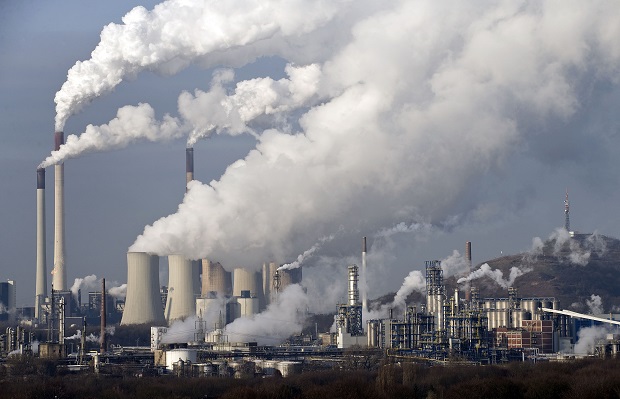From fossil fuels to epidemics: What the G-7 decided

In this Dec. 16, 2009, file photo steam and smoke is seen over the coal burning power plant in Gelsenkirchen, Germany. At the G-7 summit in Elmau, Merkel pressed for the ambitious commitment to “decarbonize” the world economy. Though the aim is distant, it’s aimed in part at helping generate momentum for a broader conference on how to combat global warming in Paris in December. AP
BERLIN, Germany — German Chancellor Angela Merkel went into the Group of Seven summit in the Bavarian Alps with a broad agenda, but combating climate change was a top priority. At the two-day meeting of the leaders of Germany, Britain, Canada, France, Italy, Japan and the U.S., the G-7’s most eye-catching pledge was a commitment to move away from using fossil fuels by the end of this century.
Here’s a look at major issues the G-7 discussed this year:
___
FIGHTING CLIMATE CHANGE
Merkel had pressed for the ambitious commitment to “decarbonize” the world economy, hoping to help generate momentum ahead of a U.N. conference in December on fighting global warming.
The G-7 countries recommitted to existing pledges, such as one to mobilize $100 billion in public and private funding by 2020 to tackle the impact of climate change. They also agreed to press for a 40 percent to 70 percent reduction by 2050 in the global emission levels of the greenhouse gases blamed for global warming compared with 2010, recommending the “upper end” of that range.
___
UKRAINE AND SANCTIONS AGAINST RUSSIA
The Western democracies used the G-7 summit to present a united front on Russia, which they ejected last year from what used to be the G-8 following its annexation of the Crimean peninsula. They made clear that any lifting of sanctions against Russia for its actions in Ukraine depends on Moscow fully implementing a peace accord brokered in Minsk in February by Germany and France. They also said the sanctions could be toughened if needed.
However, no formal decisions were made on the sanctions — and none were expected, since they were imposed by the individual countries and the 28-nation European Union. Some differences also remain among the Western nations over whether to provide Ukraine with military assistance.
___
IMPROVING GLOBAL HEALTH
The G-7 leaders said they will support plans to better fight outbreaks of deadly diseases such as Ebola, and aim to lift 500 million people out of hunger and malnutrition by 2030. They said they would better coordinate to fight future epidemics and work to ensure the rapid deployment of expert teams to needy areas.
___
FIGHTING TERROR
The G-7 met with the leaders of Iraq and Nigeria, both countries facing violent Islamic extremist insurgencies, and reaffirmed their commitment to defeating the Islamic State group “and combatting the spread of its hateful ideology.” President Barack Obama, however, said the U.S. still lacks a “complete strategy” for training Iraqi forces to fight the group.
___
WHAT TO DO ABOUT GREECE
The impasse in negotiations to unblock international financial aid to cash-strapped Greece wasn’t officially on the agenda but overshadowed G-7 discussions about the global economy. Obama said Greece needs to be “serious about making some important reforms.” Merkel, whose country is a leading creditor to Greece, said “there’s not a lot of time” and pledged to work intensively on a solution.
___
WORKING TO END CORRUPTION
British Prime Minister David Cameron went into the summit arguing that world politicians should use the scandal engulfing FIFA, soccer’s governing body, to break an “international taboo” over pointing the finger at corrupt organizations. There was little talk of corruption in the summit’s closing declaration this year but next year’s host, Japan, pledged to make it a key issue.